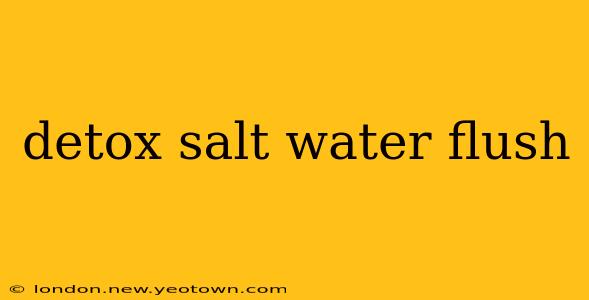The internet is abuzz with talk of detoxing, and the salt water flush is a popular method touted for its ability to cleanse the body. But does it really work? And more importantly, is it safe? Let's dive into the world of salt water flushes, separating fact from fiction and exploring how to approach this practice responsibly.
My name is Alex, and I've spent years researching natural health practices. While I'm not a medical professional, I've dedicated considerable time to understanding the nuances of detox methods, and I'll share my insights with you today. Remember, always consult your doctor before starting any new health regimen, especially if you have pre-existing conditions.
What is a Salt Water Flush?
A salt water flush involves drinking a glass of warm water mixed with a specific amount of salt, usually sea salt or Himalayan pink salt. Proponents believe this concoction stimulates bowel movements, helping to eliminate waste and toxins from the body. The idea is that the salt draws water into the intestines, creating a laxative effect. This can lead to a feeling of cleansing and lightness, but it's crucial to understand the mechanism and potential drawbacks.
How Does a Salt Water Flush Work? (Or Does It?)
The purported mechanism is osmotic pressure. Salt draws water into the intestines, increasing the volume of bowel contents and stimulating peristalsis (the muscular contractions that move food through the digestive tract). This can indeed lead to bowel movements, but it’s important to note that this isn't necessarily removing "toxins." Our bodies have sophisticated systems for eliminating waste products; the liver and kidneys do the heavy lifting, not a salt water flush.
The feeling of cleansing after a salt water flush is largely due to the emptying of the bowels, not a deep-seated detoxification process. Many of the substances marketed as "toxins" are actually byproducts of normal bodily functions and are efficiently handled by the body's natural processes.
What are the Benefits of a Salt Water Flush? (And Are They Real?)
While the "detox" claims are largely unsubstantiated, there are some potential benefits:
-
Relief from Constipation: The osmotic effect can certainly help relieve constipation by stimulating bowel movements. However, this is a temporary solution and not a long-term strategy for managing constipation. A healthy diet rich in fiber and adequate hydration is far more effective and sustainable.
-
Temporary Feeling of Cleanliness: Many people report feeling lighter and cleaner after a salt water flush, which is mainly attributable to the emptying of the bowels. This feeling shouldn't be confused with actual detoxification.
What are the Risks and Side Effects of a Salt Water Flush?
While generally considered safe when done correctly and occasionally, several risks are associated with salt water flushes:
-
Electrolyte Imbalance: Consuming excessive amounts of salt can disrupt the balance of electrolytes in your body, potentially leading to nausea, vomiting, diarrhea, and muscle cramps.
-
Dehydration: While the flush is meant to draw water into the intestines, excessive diarrhea can lead to dehydration if not properly balanced with sufficient water intake.
-
Long-Term Health Problems: Regularly using salt water flushes to "detox" can strain your digestive system and potentially lead to long-term health issues.
-
Medication Interactions: The salt water flush might interact with certain medications, so it's vital to consult your doctor if you're on any medications.
How to Do a Salt Water Flush Safely (If You Choose To)
If you decide to try a salt water flush despite the potential drawbacks, it's crucial to proceed cautiously. Always consult your doctor first. Follow these guidelines:
-
Use the Right Amount of Salt: Start with a small amount of salt and adjust as needed. Excessive salt can be harmful.
-
Use High-Quality Salt: Opt for unrefined sea salt or Himalayan pink salt. Avoid iodized table salt.
-
Drink Plenty of Water: Stay hydrated throughout the day to prevent dehydration.
-
Listen to Your Body: Pay attention to any unusual symptoms and stop immediately if you experience discomfort.
Is a Salt Water Flush Right for Me?
Ultimately, the decision of whether or not to try a salt water flush is a personal one. However, it's crucial to weigh the potential benefits against the risks and to understand that it's not a miracle cure or a true detoxifier. A healthy diet, regular exercise, and adequate hydration are far more effective ways to support your body's natural cleansing processes. If you're concerned about your health or digestive issues, consult a medical professional. They can provide personalized advice and recommend appropriate treatment options.

